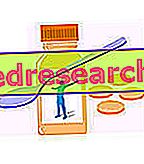Related articles: Diarrhea of the traveler
Definition
The traveler's diarrhea is an intestinal infection due to the ingestion of contaminated food and drink (eg raw vegetables, eggs, undercooked meat and fish, unpasteurized milk and derivatives). It commonly occurs during stays in countries where sanitary conditions are precarious.
The traveler's diarrhea can be caused by bacteria, viruses and parasites.
In many cases, the origin of the disorder is attributable to endemic bacteria in local water, which lacks adequate purification. Escherichia coli is responsible for most infections.
People who are immunosuppressed or treated with drugs that decrease gastric acidity (antacids, H2 blockers and proton pump inhibitors) may develop more severe forms of the disease.
Other factors that can predispose to traveler's diarrhea are travel stress, a change in diet, climate and altitude. Flies can act as passive vectors of infectious agents, bringing pathogens from one food to another.
Most common symptoms and signs *
- Asthenia
- Abdominal cramps
- Diarrhea
- Dehydration
- Dysentery
- Abdominal pain
- Muscle pains
- Temperature
- Abdominal gurgling
- Headache
- Nausea
- Blood in the stool
- He retched
Further indications
The traveler's diarrhea manifests itself with varying gravity. Generally, symptoms begin 12-72 h after ingestion of contaminated food or water. The disorder is characterized by numerous diarrheal discharges accompanied by painful abdominal cramps, nausea, profound exhaustion and, at times, fever (almost never elevated) and myalgia. Sometimes, liquid stools can be blood and, in hot climates, the patient can easily become dehydrated.
The diagnosis is essentially clinical and specific diagnostic measures are generally not necessary. However, fever, severe abdominal pain and blood stools may be associated with more serious clinical pictures and should lead to an immediate evaluation.
Most cases are mild and resolve spontaneously in 3-4 days. During this time, the most important thing is to replenish liquids (avoiding carbonated beverages, alcohol, coffee and tea) and eating light food. In some cases, taking antinausea and antidiarrheal drugs can help alleviate symptoms. If after a few days the intestine is not regularized, it is best to consult a doctor to evaluate the administration of a specific antibiotic (eg ciprofloxacin or levofloxacin, azithromycin and rifaximin).
As for prevention, travelers should avoid buying food and drink from street vendors, eating only cooked (still hot) foods, fruit that can be peeled, and drinks served in a closed bottle without ice. Furthermore, raw vegetables should be avoided. Attention also to bathing and not to use tap water, not even to brush your teeth.



